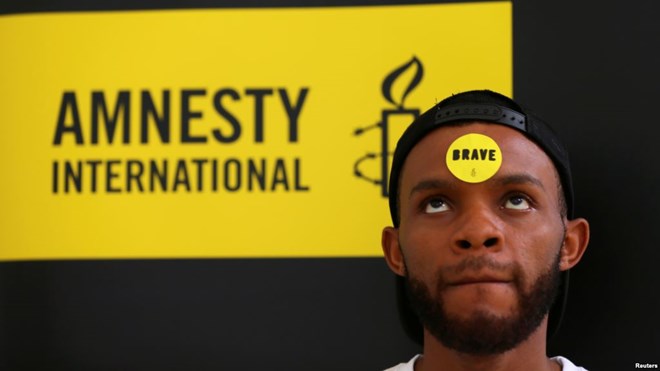
Thursday April 12, 2018
By Chika Oduah
 FILE - Human rights campaigner looks on during the release of an Amnesty International report in Abuja, Nigeria, May 16, 2017.
FILE - Human rights campaigner looks on during the release of an Amnesty International report in Abuja, Nigeria, May 16, 2017.
DAKAR — State-sanctioned executions and death sentences decreased in 2017, including in sub-Saharan Africa, according to a new report by Amnesty International.
Amnesty International is careful to note the global decline in the use of the death penalty in 2017 was preceded by record highs in executions in 2015 and death sentences in 2016.
Rights activists see the downturn as cause for hope, and Amnesty says sub-Saharan Africa is leading the trend.
“It feels like there is a momentum in sub-Saharan Africa towards abolition that is partly because of public pressure around that and it is partly because judges in some cases can use more discretion,” says Amnesty's West and Central Africa deputy director, Steve Cockburn.
He says countries in the region are eager to appear progressive.
In 2017, Guinea became the 20th country in sub-Saharan Africa to abolish the death penalty for all crimes. Meanwhile, Kenya’s Supreme Court abolished the mandatory death penalty for murder. Burkina Faso is drafting a new constitution that rights activists expect will outlaw the death penalty. The same goes for Gambia, following President Yahya Jammeh’s ouster in 2016.
Gambian human rights activist Baba Leigh was once detained and tortured for his outspoken criticism of the Jammeh government’s execution of prison inmates.
“It is a great thing. I feel so much victorious. Look here is something I was fighting for 40 something years. It has become real,” says Leigh.
Amnesty says South Sudan and Somalia were the only countries in sub-Saharan African known to have carried out death sentences last year. Somalia had by far the most executions, 24, according to Amnesty.
Somali activist Abdi Salam Adan told VOA the death penalty is needed to fight terrorism.
“In Somalia’s case, it happens when they suspect someone who is a member of al-Shabab terror group, they investigate and then they say 'OK, he is among those people who killed innocent Somali’s.' They kill. They shoot him," he said. "Sometimes, they have to kill because he has killed someone, and in Islamic law if you kill you have to be killed.
Nigeria leads the pack for death sentences in sub-Saharan Africa, with 621 death sentences handed down last year and more than 2,000 inmates on death row. But Nigeria has carried out no executions since 2016, when it executed three prisoners by hanging.
Prison reform activist Sylvester Uhaa told VOA the Nigerian justice system is too corrupt to impose death sentences.
“What we need to do is to invest in our youth, invest in education, invest in employment, invest in other ways of reducing crime especially violent crime in our society and this is what our country has failed to do over the years,” he said.
The Nigerian Prison Service told VOA that deepening democracy in Nigeria is why state governors are reluctant to actually sign death warrants. Instead, last year saw a few governors commute dozens of sentences to life imprisonment.